In this post, we reveal everything you need to know about alkaline water, including its benefits and how to make it at home. Let's dive in!
Introduction
Alkaline water and the alkaline diet might seem like the newest celebrity fad with actresses such as Jennifer Aniston, Gwyneth Paltron and Kirsten Dunst touting its benefits. While the alkaline diet is a relatively new healthy eating lifestyle, alkaline water has been consumed for hundreds of years according to Ayurvedic practices.
Ayurveda, a Sanskrit term meaning “knowledge of life”, is an ancient and preventative wellness practice originating from India and Asia. In these countries, alkaline water has been consumed for hundreds of years via copper water pots and vessels. Additionally, our ancestors who drank from natural springs were also drinking nutrient-dense alkaline water.
These days, alkaline water can be manufactured, made at home and even purchased at the grocery store. But what is alkaline water and why should you drink it? Is it actually that good for you? What kind of alkaline water should you be drinking? There is a lot of information out there and some of it is confusing or conflicting, which is why we have compiled this comprehensive and science-backed guide that will help you learn everything you need to know about alkaline water and its amazing benefits. Keep reading to learn more!
This guide discusses the following subjects, among others:
- What is Alkaline Water?
- Understanding the pH of Water
- Is Alkaline Water Good for You?
- Alkaline Water Benefits
- Alkaline Water and Cancer
- Alkaline Water and Diabetes
- Alkaline Water and Acid Reflux
- Alkaline Water Side Effects and Risks
- Can You Drink Alkaline Water Every Day?
- Is Drinking Too Much Alkaline Water Bad for You?
- Types of Alkaline Water
- Natural Alkaline Water
- Ionized Alkaline Water
- Distilled Alkaline Water
- Alkaline Additives
- Others
- How to Make Alkaline Water
- Alkaline Water Machines
- Alkaline Water Filters
- Alkaline Water Drops
- Alkaline Water Bottles
- Copper Water Bottles
- The Best Ways to Make Homemade Alkaline Water
- The Nine Best Bottled Alkaline Water Brands
- Where to Buy Alkaline Water
What is Alkaline Water?
The ‘alkaline’ in alkaline water refers to the water’s pH level. pH, meaning the power of hydrogen, is a scientific term that measures a liquid’s acidity or non-acidity. All liquids have a pH, which are numerically measured on a scale of 0 to 14. Liquids with a lower pH (0-6), like coffee and vinegar, are more acidic. Liquids with a higher pH (8-14), like liquid soap and baking soda, are less acidic and therefore alkaline, or basic. A pH of 7 is neither acidic nor alkaline. Pure water has a pH of 7. Healthy alkaline water will most often have a pH of 8 or 8.5, however, some more extreme examples of alkaline water will have a pH of 10 or higher.
While the pH value is important when understanding or labeling alkaline water, there are other factors that make a good alkaline water actually good. The minerals in alkaline water are also very important. According to Harvard Medical School, our bodies need many different metals to make our bodily systems run smoothly. Calcium, chromium, copper, iron, magnesium, manganese, molybdenum, potassium, sodium and zinc are just a few essential minerals for our health. The best kind of alkaline water will possess some of these minerals and more. Most often, the type of alkaline water that possesses these minerals is natural alkaline water; however, some bottled alkaline waters and alkaline water drops supplement these minerals by adding them to their artificial water and solutions. Later on we will discuss why it is so important that these minerals be present in the alkaline water you choose to drink.
Understanding the pH of Water

As explained above, all liquids have a pH. Pure water has a pH of 7, but purifying water to the point of a perfect 7 pH can be a pretty difficult and lengthy process. As such, different types of water have different pH values. Generally, tap water and most common bottled waters have a pH range between 6.5 and 7.5. Water with this pH is perfectly healthy to consume. High pH water, or alkaline water, is also healthy to consume in moderation. Alkaline water typically has a pH value between 8 and 9, but some artificial alkaline water has a pH of 12 or even 13. If drinking alkaline water with an extreme pH, practice extra caution as excessive alkalinity can lead to detrimental health problems. Furthermore, water this alkaline will have a bitter, unenjoyable taste. Ideally, for long term human consumption, your alkaline water should have a pH between 8.5 and 9.5.
Is Alkaline Water Good for You?
Many health practitioners believe that the answer to this question is “yes”, assuming that the alkaline water is consumed in moderation. Although the scientific community has not performed many studies on the subject, proponents of alkaline water have shared their positive experiences through online communities and health magazines. Even if you are skeptical of the benefits of alkaline water, the good thing is that very few bad side effects have been recorded. Thus, there is likely little risk in at least trying a good quality alkaline water and evaluating how it makes you feel. If wishing to try alkaline water, make sure to know where the alkaline water you buy comes from or read warning labels on the water filters or alkaline solutions you buy. In addition, if you have any special medical conditions, make sure to consult with a medical professional before trying alkaline water.
In addition to the potential health benefits of alkaline water, oftentimes consumers will find they prefer the taste of alkaline water compared to tap water or other bottled water brands. This is another benefit to drinking alkaline water because it often encourages people to drink more water than they normally would, and staying hydrated is always a good thing! It is recommended that you drink two liters of alkaline water each day. You can also use alkaline water in the preparation of beverages or food. Generally, using alkaline water to cook helps in balancing the food’s alkalinity and can even make it taste better. Food and beverages like coffee and pasta, which are more acidic in nature, can especially benefit from being prepared with alkaline water.
Alkaline Water Benefits
Advocates of alkaline water believe that it has many different beneficial and healing advantages and properties. These advocates believe that the water’s alkalinity is able to neutralize acid within the body and create various positive effects, including the following:
- boosts energy levels
- increases clarity of mind
- fewer headaches
- improves breathing
- lessens throat irritation and mucus
- slows the aging process
- boosts the immune system
- supports weight loss
- encourages regular bowel movements
- detoxes and cleanses the body, especially the colon
- hydrates the skin and improves complexion
- helps strengthen muscles and joints
- improves circulation
- increases oxygen distribution within the body
It has also been said that alkaline water is capable of treating people with irritable bowel syndrome (IBS). IBS patients whose primary symptom is diarrhea found that after drinking alkaline water with pH values between 8.5 and 10 for eight weeks their symptoms improved. Alkaline water has also been advertised as a perfect companion to a strenuous workout. This is because alkaline water allows “active people to retain more fluid in the cardiovascular system.” In other words, it is ultra-hydrating. Furthermore, alkaline water has been proven to reduce bone resorption, a process where aging bone cells break down and get replaced by new cells. When bone resorption is reduced, accompanied by greater mineral density, you get stronger, healthier bones.
One 2016 study published in the Evidence-Based Complementary and Alternative Medicine journal observed a group of 150 mice over a period of three years. It was discovered that the alkaline-watered mice benefited from the water in terms of its “deceleration aging factor.” In other words, they had a longer lifespan compared to the control group. However, one should be cautious when extrapolating findings directly from animal studies to human health, as they are not always relatable.
However, few of the other advantages listed above are backed by scientific studies. Unfortunately, there are not many studies that have attempted to observe these alkaline water benefits, but many drinkers of alkaline water report that they have experienced these effects after drinking alkaline water for a prolonged period of time. Despite this lack of scientific research, there are a few notable studies that support the healing properties of alkaline water. These studies have links to the treatment of diabetes and acid reflux disease.
Alkaline Water and Cancer
Some manufacturers and health websites have claimed that alkaline water is a miracle product when it comes to preventing or treating cancer. Unfortunately, at this time, no studies have been performed to support these claims. On the contrary, these claims have been refuted by several medical professionals.
Some manufacturers claim that by introducing alkaline into the bloodstream, the alkalinity can slow or stop cancer, which cannot survive in an alkaline environment. However, one cannot introduce enough alkaline into the bloodstream to affect the body’s acidity just by drinking alkaline water alone. So, while this may work in a lab setting, it simply does not correlate to the intricate and complex human body.
While alkaline might not be a cure-all for cancer, other studies have explored its special healing properties.
Alkaline Water and Diabetes
In the past few decades, diabetes has become an increasing risk for both juveniles and adults. There are two main types of diabetes: Type 1 and Type 2. Type 1 diabetics, who are most often children and young adults, are insulin-dependent as their pancreas is incapable of producing enough insulin for their bodies. Type 2 diabetes, also known as adult-onset diabetes, develops due to poor dietary habits, which results in fluctuating blood sugar levels that overwork the pancreas. While there are numerous treatments available for both types of diabetes, some diabetics and studies have found that alkaline water can be beneficial for those suffering from diabetes.
In 2001, the Shanghai Journal of Preventive Medicine published research that studied alkaline water’s effect on blood pressure, blood sugar and blood lipids. After drinking alkaline water for 3 to 6 months, the participants experienced decreased levels of blood pressure, blood sugar and blood lipids. Some participants even experienced a significant decrease, resulting in normal range readings for each of these factors. Based on these findings, the researchers have suggested alkaline water be used as a therapeutic method for hypertension, diabetes and hyperlipidaemia.
Another study performed in 2012 at Dongduk Women’s University in South Korea found that diabetically induced mice showed improved blood glucose control after drinking alkaline-ionized water. The researchers suggest that alkaline water may function as an anti-diabetic agent as it was able to reduce blood glucose concentration and improve glucose tolerance in the diabetic mice. Once again, one should remain cautious when drawing from animal studies and applying the findings to human health.
Alkaline Water and Acid Reflux
Studies have also been performed to observe the effect of alkaline water on acid reflux. One of the most cited studies on this subject was published in the medical journal Annals of Otology, Rhinology & Laryngology in 2012. This in vitro lab study found that naturally occurring alkaline water with a pH of 8.8 is capable of denaturing, or destroying, pepsin, the enzyme responsible for activating acid.
Although this experiment was only conducted in a petri dish, many patients with reflux disease have consumed alkaline water and experienced less acidity in the oral cavity and esophagus. As such, patients who struggle with acid reflux are encouraged to try natural alkaline water if looking for a more natural or holistic approach to treating their acid reflux disease.
Alkaline Water Side Effects: Disadvantages of Alkaline Water
While drinking alkaline water is considered generally safe, there are a few side effects and risks you should be aware of before making the switch to two liters of alkaline water per day.
First, it should be noted that most side effects and risks have a greater association with artificial alkaline water versus natural alkaline water. This is because artificial alkaline water tends to be more alkaline than natural alkaline water. Excessive alkalinity can lead to a decrease in natural stomach acidity. Stomach acid, or gastric acid, is a digestive fluid that breaks down the food we consume. A decrease in gastric acid can eventually result in disease and gastrointestinal distress. This acid has a pH between 1.5 and 3.5 and is needed to digest what we eat in addition to protecting our bodies from bacteria and viruses. If our stomachs have less acid, our bodies have a reduced ability to fight bacteria and other harmful pathogens.
Drinking too much high pH alkaline water (water with a pH value over 9), can also negatively affect our skin. Consuming too much of this kind of alkaline water can result in dry, itchy and irritated skin. While decreased stomach acid and irritated skin can be a negative side effect for anyone who drinks high pH alkaline water, people with kidney problems should generally stay away from all types of alkaline water. For example, if you have a kidney condition or need to take medication that alters kidney function, the minerals in alkaline water could start to accumulate in the body. While minerals are great for the body in moderation, too many can lead to innumerable negative effects.
It should also be noted that the above are short-term effects and risks. The long-term risks of alkaline water simply have not been studied, so there may be risks that scientists are unaware of. If you are nervous to begin drinking alkaline water, we suggest starting slow with a low intake and increase the amount gradually. This will help your body adjust to the added alkalinity in your diet.
Can You Drink Alkaline Water Every Day?
It is perfectly acceptable to drink alkaline water every day. If wishing to drink it every day, limit yourself to two liters of natural alkaline water per day. If consuming artificial alkaline water, consume less than two liters but monitor your symptoms to see if you need to drink less or can increase the amount you drink each day. However, proponents of alkaline water do suggest taking breaks from drinking it every fourth month. For example, you can drink alkaline water whenever you wish for a three month period but, during the fourth month, it should not be consumed at all. These breaks will ensure that you are not drinking too much alkaline water.
Is Drinking Too Much Alkaline Water Bad For You?
Consuming too much of anything is generally considered to be a bad thing and alkaline water is no exception to that general principle. Drinking too much alkaline water per day or even over time can lead to alkalosis. While alkalosis is rare, it can occur if you have consumed too much alkaline water. If you have been drinking alkaline water for a while now but start to experience nausea, vomiting, tremors, muscle twitches or confusion, it is possible that you have alkalosis and should stop drinking alkaline water immediately and contact your healthcare provider.
Types of Alkaline Water
When researching alkaline water, you may get confused at all the different terminology and categorizations used. Luckily, we are here to clear the confusion and set the record straight by identifying and explaining the different types of alkaline water.
Natural Alkaline Water
Natural alkaline water, sometimes called “naturally alkalinized water” or “living water”, is water that is naturally alkaline. No fancy or drawn out processes needs to be performed for this type of water to have a pH between 7 and 8.5. This type of alkaline water is naturally basic, full of good essential minerals and mostly sourced from natural springs and rivers. As the water from the spring flows against the rocks, the water absorbs different minerals from the rocks, which increases the water’s pH value.
As mentioned earlier, drinking alkaline water with minerals is better than drinking artificial alkaline water. This is because alkaline water sourced from natural springs and rivers contains more total dissolved solids (TDS). These solids are the minerals absorbed by the water, including silica, bicarbonate, calcium, magnesium, sodium and potassium. According to researcher and professor Haider Abdul-Lateef Mousa, higher TDS concentrations in drinking water correlates to lower total-mortality rates as well as fewer incidences of coronary heart disease, arteriosclerotic heart disease and cardiovascular disease.
Furthermore, alkaline water with alkaline minerals results in negative oxidation reduction potential (ORP). ORP is a popular water quality parameter that measures water’s ability to act as a pro- or antioxidant. A higher negative ORP value means the water is more antioxidizing. Antioxidants, also called “free-radical scavengers” are substances that are able to prevent or slow damage to cells by free radicals. Natural, and properly ionized alkaline water, has very high negative ORPs. The rich minerals and properties found in natural alkaline water have amazing health benefits, giving us even more reasons to start drinking alkaline water!
For a more detailed discussion, reader our blog post on natural alkaline water.
Ionized Alkaline Water
Ionized alkaline water is also referred to as “artificial alkaline water” or “artificially alkalinized water”. As the name suggests, this type of alkaline water is produced through an alkaline water machine or electrical ionizer. As tap water passes through the machine, a process called electrolysis, or ionization, occurs. Through electrolysis, the water is repeatedly electrocuted by electric currents that push the water over metal plates made from platinum and titanium. As the water forcefully passes over the plates, platinum and titanium ions are produced. These ions increase the alkalinity in the water, sometimes resulting in extreme synthetic pH values of 12 or even 13.
However, note when water becomes this alkaline, it can actually be harmful to your health. For this reason, you should exercise caution when consuming artificially alkalinized water. Furthermore, consuming too much artificial alkaline water can trick your body by making it think it is receiving water with lots of vital minerals. Because your body thinks it is getting a refill of these vital minerals, it may release its mineral reserves into the bloodstream and kidneys. Over time, this can result in mineral deficiency.
Distilled Alkaline Water
Distilled water is a type of purified water. The distillation process involves boiling water into a vapor and then condensing the vapor back into a liquid in a new container. Through this process, any impurities in the water are left behind in the old container. Distilled water is usually purchased in gallon jugs at the store. The only way to make distilled water alkaline is to add alkaline additives like baking soda or store-bought alkaline drops. While you can do this, most proponents of alkaline water suggest against this. In general, distilled water does not taste good due to the lack of minerals and is slightly acidic. With no essential minerals and a bitter taste, distilled water is not your best option if wishing to make your own alkaline water at home.
Alkaline Additives
Alkaline additives are solutions that can be added to water to make it more alkaline. These solutions can be as simple as adding baking soda or lemon slices and as complicated as pH drops sold at pharmacies. These types of solutions contain minerals and electrolytes that boost the alkalinity in water. Adding the right amount leads to the creation of alkaline water!
One simple alkaline additive is probably already sitting in your pantry: baking soda. Simply add ½ teaspoons of baking soda to a gallon of filtered water. To dissolve the baking soda, stir or shake the water vigorously. Another easy way to make your own alkaline water at home is to add fresh lemon slices to your drinking water. Although lemons are acidic and it may seem counterproductive to add something acidic to make the water alkaline, once you drink the lemon water, it will actually become alkaline during the digestive process because your body reacts with the acid in a certain way. If choosing this method to make alkaline water, just make sure to use freshly cut lemons. Using old lemons will not result in the same outcome.
Others
There are a few other ways to make or purchase alkaline water. For example, one alternative to purchasing a water ionizer is to purchase an alkaline water filter. Alkaline water filters can be installed on your sink or purchased as pitchers. The filters contain minerals and electrolytes that turn the water alkaline as they pass through.
Another alternative for making alkaline water is to store your drinking water in a copper vessel. There are several benefits to storing water in copper. One of those benefits is that the water becomes more alkaline the longer it is in contact with the copper surface. Both of these options will be further explained in the next section of this article.
How to Make Alkaline Water
While buying alkaline water is a popular option for many, some might prefer to make their own alkaline water at home. Luckily, as alkaline water becomes more popular, more ways to make it at home have been created. In this section, we will discuss some of the most popular ways to make your own alkaline water.
Alkaline Water Machines
Alkaline water machines are often called water ionizers. These appliances bring the electrolysis process described earlier in the article straight to your home. The machines originated in Japan and other East Asian countries. Today, they remain popular in the East with growing popularity in the U.S. and Europe. Some machines even come with artificial powders which can be added to the water to increase the alkalinity even more, sometimes reaching pH values of 12 or 13.
Before investing in an alkaline water machine, be sure to do your research and get ready to spend some serious money. Most water ionizers cost thousands of dollars and are expensive to operate, maintain and repair. Additionally, drinking artificial alkaline water made by machines for long periods of time can have negative health side effects as the titanium and platinum plates used in the machines can be toxic if the water produced is consumed excessively.
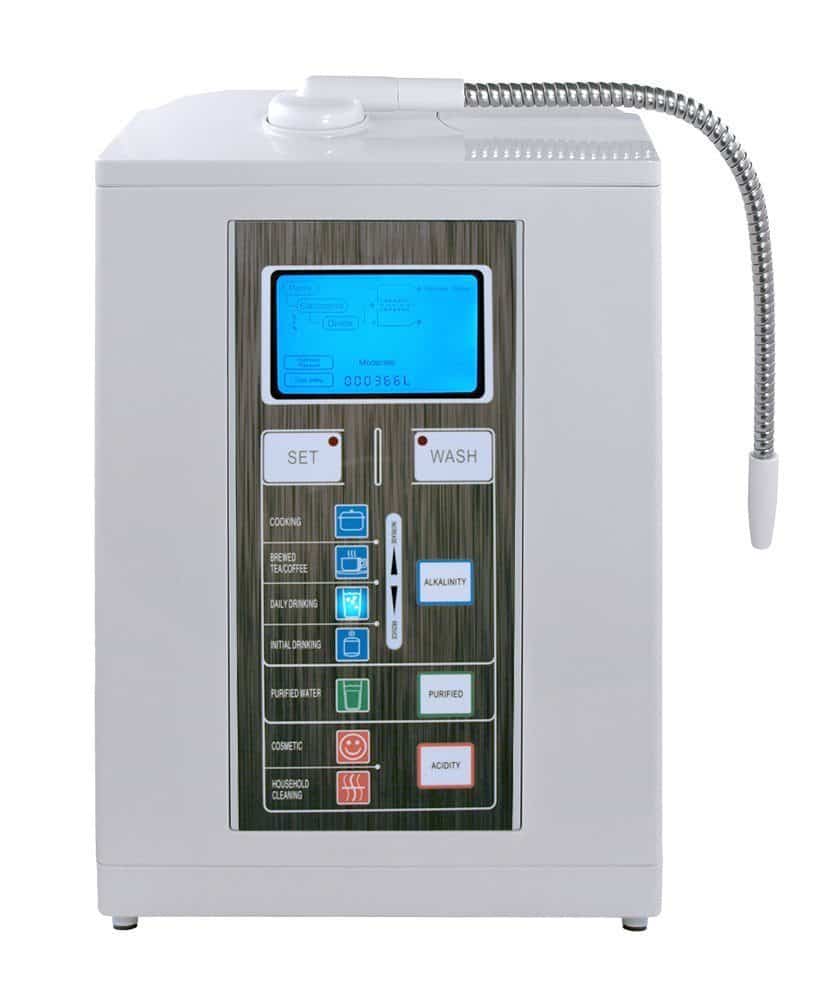
Alkaline Water Filters
Alkaline water filters can be installed on your kitchen sink or be purchased as pitchers. Under-the-sink alkaline water filtration systems remove harmful bacteria when filtering your home’s water and add minerals like calcium, potassium and magnesium to the water. Alkaline water pitchers come with filter cartridges that increase water pH levels. The filter cartridges for these products generally last for one month when used frequently. These are good options for those wishing to filter and increase their tap water’s pH value at the same time. Furthermore, these products tend to be less expensive than water ionizers.
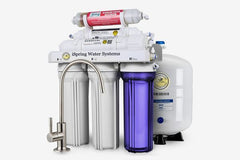
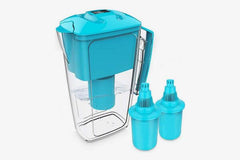
Alkaline Water Drops
Alkaline water drops are a type of alkaline additive. The drops function as pH boosters by injecting the water with high concentrations of minerals and electrolytes. Generally, alkaline water drops come in small, portable bottles which make them perfect for on-the-go travel or a night out at your favorite restaurant. With these solutions you can easily add a few drops to various beverages, from water to coffee, tea or juice. Some companies also make larger bottles for adding drops to gallon jugs. The small bottles tend to cost between $10 and $20 and will alkalinize hundreds of glasses of water. pH water drops can be purchased online or at pharmacies and health food stores.

ALKAZONE pH Drops
Alkaline Water Bottles
If you do not wish to make your own alkaline water or are wanting to test the waters, so to speak, you can purchase artificial and natural alkaline water sold in water bottles. While there are many different brands, which will be discussed further on, it is important to keep in mind that buying alkaline water can certainly add up. Additionally, plastic bottles are bad for both humans and the environment. The dangerous chemicals in plastic can leach into the water in addition to cluttering our landfills. If you are looking for a more environmentally friendly water bottle that naturally increases water’s pH, a copper water bottle would be a perfect match!
Copper Water Bottles
As mentioned in the introduction, drinking water from a copper vessel is an ancient Ayurvedic practice. It is very common in India and Asia for families to store water in copper pots, where the copper in the pots purifies and alkalizes water. According to Ayurvedic medicine, “tamra jal” is the practice of drinking copper infused or copper charged water. In addition to copper water being alkaline, it has many great health benefits. For example, as per Ayurveda, copper water is used to balance the doshas and address physical and mental ailments, like heartburn and congestion.
A personal copper water bottle is a great, safe, easy and inexpensive way to make homemade alkaline water! When water is stored in a copper vessel, a few things take place. For starters, copper is anti-bacterial and anti-viral, meaning it purifies the water it holds. In fact, scientists have found that copper is such an effective anti-microbial surface that it can kill serious bacteria like E.coli and salmonella in a matter of a few hours. For a great summary of the research on copper's anti-microbial properties, read our post on the subject here.
Copper infused water is also considered an effective antioxidant, supporting better health and immunity while preventing aging and eliminating and cleansing the body of toxins and free radicals. In addition to purifying water, copper water bottles can increase water’s alkalinity. This happens because the water naturally and safely absorbs small amounts of copper from the bottle. This absorption naturally ionizes the water, which increases the water’s alkalinity. The longer water is stored in a copper bottle, the higher the pH.
If wishing to alkalize water with a copper bottle efficiently, we suggest buying a hammered copper water bottle. Hammered copper water bottles have a greater surface area with which to infuse and charge the water with copper ions.

A hammered copper water bottle by Copper H2O
If you are worried about consuming too much copper, the World Health Organization (WHO) published its Guidelines for Drinking Water Quality wherein they establish the upper limit for consumption of copper in water: 2.0 ppm (or 2 milligrams per liter). This number is much higher than any amount of copper found in water stored overnight in a copper water bottle, pitcher or pot. However, if you are concerned about drinking too much copper infused water, you can follow the pattern suggested for drinking alkaline water - namely, you can take a month break for every three months of drinking from a copper water bottle..
The Best Ways to Make Homemade Alkaline Water
We believe one of the best ways to make your own alkaline water is to purchase a 100% pure high-grade, food-safe copper water bottle. Making your own alkaline water with a copper bottle is inexpensive, safe and great for the environment. With this method of making alkaline water, pour room temperature or slightly warm (but not hot) water into your bottle at night before you go to bed. The temperature of the water will affect the alkalizing process; room temperature or warm water speeds this process up. Fortunately, the type of water you use is up to you. You can use tap water, filtered water or bottled water to make alkaline water with a copper bottle. When you wake up in the morning, drink your copper alkaline water first thing for a healthy and refreshing start to your day. A second glass of alkaline copper water can be consumed before bed, so make sure to start the alkalizing process at the appropriate time. If you find that your copper water is ready to be consumed but you are not thirsty, you can pour the copper charged water into a glass to consume it later.
When not using your copper bottle, you will find it easy to clean and store in your cabinet. In fact, copper water bottles require less cleaning than other water bottles due to their self-sterilizing and anti-microbial properties!
If you are looking for a way to provide your entire family or household with alkaline water, perhaps a personal copper water bottle is not the best option for you. In this case, consider purchasing a copper water pitcher, or an at-home water pitcher that filters the water to make it more alkaline. With this method, you can make multiple liters of alkaline water per day ensuring you have enough healthy and delicious water for each of your family members. Another great way to make large quantities of alkaline water at home is to use the baking soda method described in the "Alkaline Additives" section of this post. Making your own alkaline water does not have to be costly or difficult!
The Nine Best Bottled Alkaline Water Brands
We know that there is a lot of competition out there when it comes to bottled alkaline water. To help you find the brand best for you, we have compiled a list of the nine best bottled alkaline water brands. Let’s get started!
1. Essentia Ionized Alkaline Water
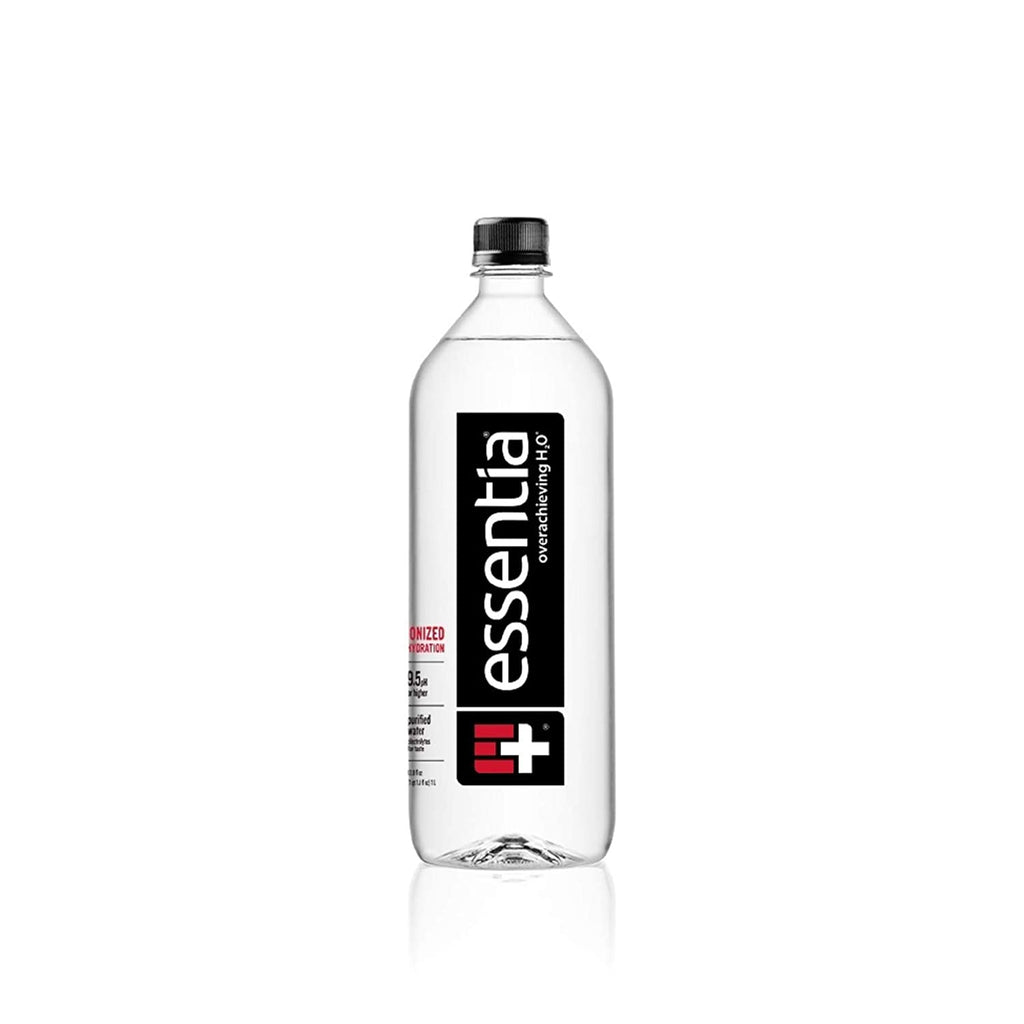
Essentia consistently comes in as the highest-rated alkaline bottled water on the market today. Many consumers find that it has a cleaner and smoother taste compared to other bottled waters. Perhaps this is due to Essentia’s thorough purification process which combines microfiltration and reverse osmosis to produce 99.99% purified water. With a pH value of 9.5, it is clinically proven to hydrate better than tap water. Its added electrolytes and great pH level give Essentia the top spot on our list.
2. Evamor Natural Alkaline Artesian Water
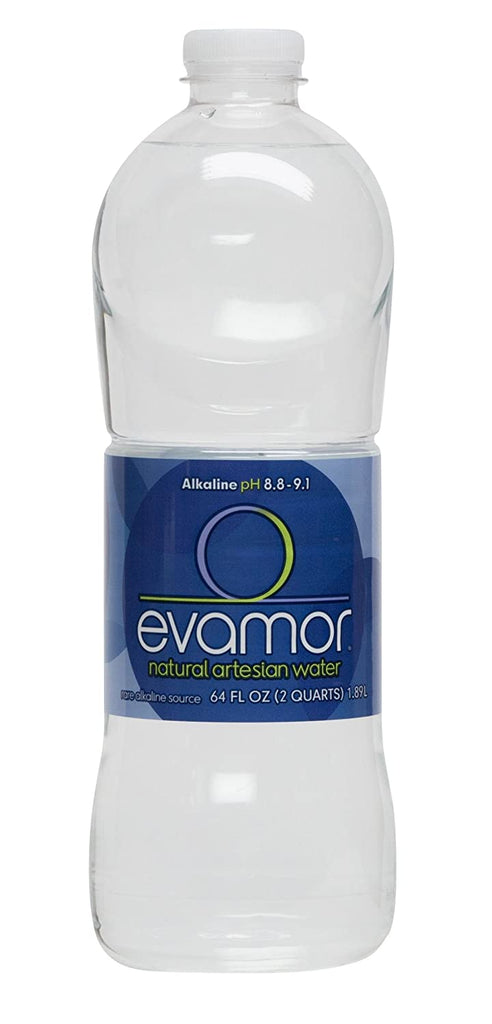
If not wishing to drink artificially alkalinized water like that of Essentia, there are also many brands that bottle natural alkaline water. One such brand is Evamor. Evamor’s artesian water is locally sourced from a protected aquifer. The pH value of this water ranges from 8.8 to 9.1.
3. LIFEWTR pH-Balanced Purified Water

LIFEWTR is a popular water bottle brand that has started to make pH-balanced water. This water might be good for those who are interested in alkaline water but are not ready to take the plunge as it is only slightly alkaline with pH values between 6.4 and 7.4. LIFEWTR is purified using reverse osmosis and has added electrolytes that improve it’s taste.
4. Icelandic Glacial Natural Spring Water
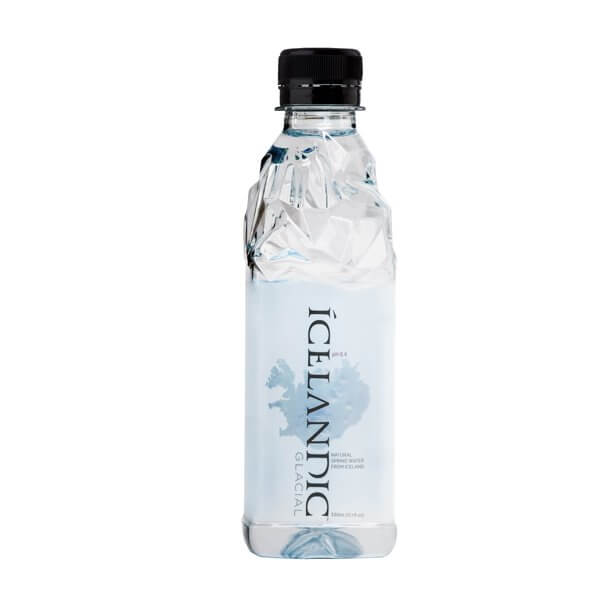
Another natural alkaline water bottle option is Icelandic Glacial Natural Spring Water. The water is sourced from Iceland’s Ölfus spring and has a natural pH of 8.4. Those who drink Icelandic Glacial water often claim it is the best tasting water they have ever had.
5. AQUAhydrate Electrolyte Enhanced Water
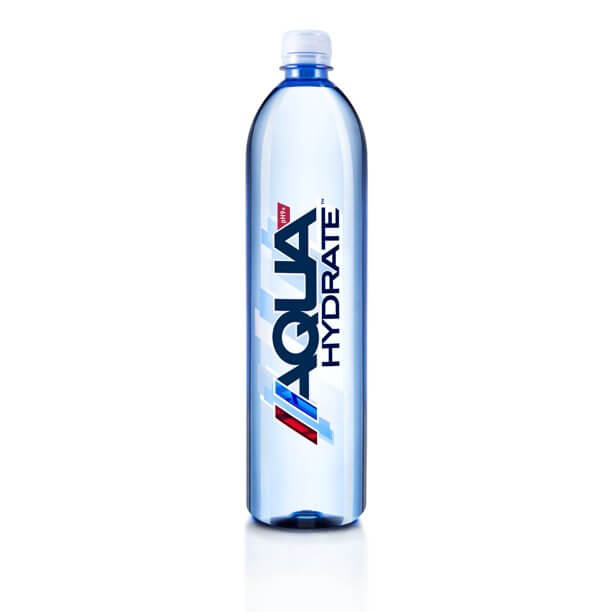
Although AQUAhydrate is considerably more expensive than its competitors, this water has a pH over 9 and is great for those looking to rehydrate after a hard workout. AQUAhydrate is purified with reverse osmosis and UV filtration and has an artificial pH of more than 9. Additionally, it is infused with good natural minerals and electrolytes.
6. Flow Alkaline Spring Water

Flow Alkaline Spring Water is naturally sourced from a family-owned spring in Ontario, Canada and has a pH of 8.1. Each bottle of Flow water is packaged in 100% recyclable paper cartons. If you like flavored water, Flow is a great choice for you as there are many different natural flavor options from Blackberry and Hibiscus to Grapefruit and Elderberry.
7. Qure Alkaline Water
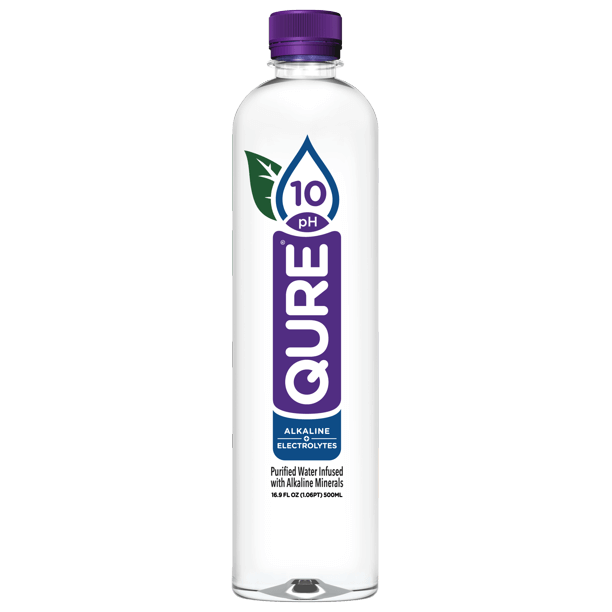
Qure Alkaline Water has an artificial pH level of more than 10. This water is produced through an extensive nine-stage reverse osmosis purification process. The added ionic alkaline minerals and electrolytes increase the pH levels in the water.
8. WAIĀKEA Hawaiian Volcanic Water
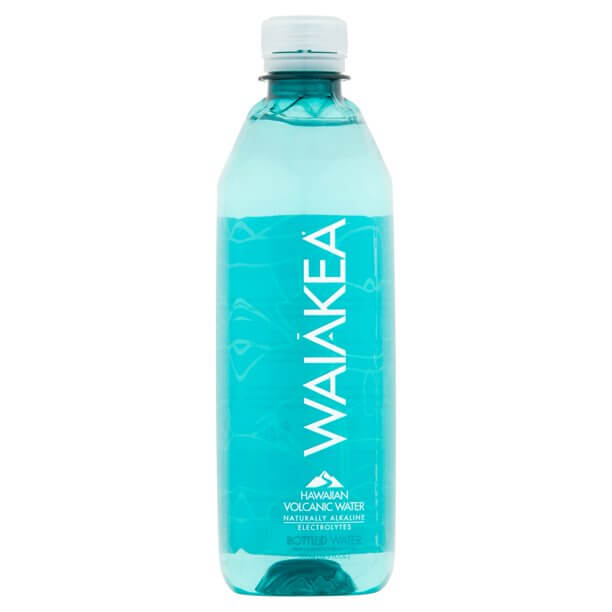
WAIĀKEA water is natural alkaline water that has an increased pH level due to passing through thousands of feet of porous lava rock on Hawaii’s Big Island. It is electrolyte rich with a pH between 7.6 and 8.2. In addition to its great alkaline benefits, it is smooth and delicious to drink!
9. TEN Alkaline Spring Water with Electrolytes

The last bottled alkaline water on our list is Ten Alkaline Spring Water. As you might have guessed from the name, Ten Alkaline Spring Water has a pH value of 10. Naturally sourced from the Blue Ridge Mountains, TEN water is also rich in alkaline minerals and electrolytes.
Where to Buy Alkaline Water
Due to its increase in popularity over the years, alkaline water can be purchased from a variety of online stores in addition to local grocery stores, health food stores and gas stations. If you are interested in buying a specific brand, most brands sell packs of water directly from their websites as well.
Conclusion
Drinking alkaline water, especially natural alkaline water, can result in many benefits for your body and overall health. Through scientific studies and personal testimonies, we have seen that alkaline water can treat ailments like heartburn and diabetes while also boosting our immune systems and hydrating our bodies. From installing filters to buying bottled water to making your own alkaline water with a reusable copper water bottle, there are so many ways to incorporate alkaline water into your life. We hope we have given you all the information you need to know in order to make the switch to alkaline water today!
About the Authors: This article was collaboratively written by our team of researchers and writers with the benefit of all available scientific studies and other relevant literature. Our team of researchers and writers include experienced health researchers including a qualified medical professional. Please note that information in this article is not intended or implied to be a substitute for professional medical advice, diagnosis or treatment.
Did You Enjoy This Article?
Thank you for reading! If you enjoyed this article, you might also like the following articles: The Health Benefits of Natural Alkaline Water and The 5 Best Drinks for Dehydration


2 comments
Nov 28, 2023 • Posted by Copper H2O
Hi Mital, thanks for your question! Yes, you can store alkaline water in a copper water bottle without issue. We hope that helps!
Nov 28, 2023 • Posted by Mital Nahar
My question is can we store alkaline water in copper bottle?
Leave a comment: